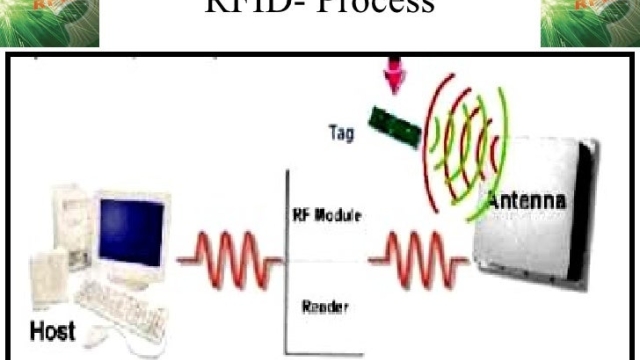RFID technology has emerged as a groundbreaking solution, revolutionizing the way we connect and streamline our daily operations. With its ability to wirelessly track and identify objects in real-time, this technology has paved the way for increased efficiency, enhanced security, and improved inventory management across various industries.
At its core, RFID, which stands for Radio Frequency Identification, is a system that uses electromagnetic fields to wirelessly transfer data between a reader and an RFID tag. This tag, which can be affixed to objects of all shapes and sizes, contains a unique identifier that can be read by an RFID reader within its vicinity. Enabling seamless communication with minimal human intervention, RFID technology has become an invaluable asset in the world of connectivity and logistics.
By harnessing the power of RFID, businesses can optimize their supply chain processes, ensuring smooth inventory control and reducing errors. The ability to remotely track and manage assets in real-time, with unparalleled accuracy, empowers organizations to make informed decisions swiftly and streamline their operations. Not only does RFID improve the overall efficiency of operations, but it also enhances customer satisfaction through faster and more accurate fulfillment of orders.
In addition to its impact on the logistics industry, RFID technology has transformed other sectors as well. From healthcare, where it aids in patient identification and medication management, to retail, where it enables frictionless checkout experiences, RFID has truly revolutionized various aspects of our daily lives. The potential of RFID is vast and continues to unfold as businesses and industries explore innovative ways to leverage its capabilities.
In conclusion, RFID technology has undeniably brought about a paradigm shift in connectivity and efficiency across industries. With its ability to wirelessly track and identify objects, this game-changing technology has paved the way for improved supply chain management, enhanced security, and enhanced customer experiences. As we continue to embrace the power of RFID, its potential for further innovation and transformative applications is truly limitless.
1. Understanding RFID Technology
RFID technology, short for Radio Frequency Identification, is a revolutionary system that allows the identification and tracking of objects through radio waves. Utilizing small electronic tags, known as RFID tags or transponders, this technology has made significant advancements in various industries by providing a reliable and efficient method of data collection.
The core principle behind RFID technology lies in the ability of these tags to communicate wirelessly with RFID readers or scanners. These tags consist of a microchip and an antenna, which work together to transmit and receive data. The microchip stores and processes information, while the antenna enables communication by transmitting and receiving radio signals.
One of the key advantages of RFID technology is its ability to enable automatic and non-line-of-sight data capture. Unlike traditional barcode systems that require direct line-of-sight scanning, RFID tags can be read from a distance and even through objects such as packaging or containers. This feature greatly enhances the speed and efficiency of inventory management, asset tracking, and supply chain logistics.
Furthermore, RFID technology offers a high level of accuracy and reliability in data collection. The unique identification codes stored in each RFID tag ensures precise tracking and eliminates errors that may occur with manual data entry. This not only streamlines operations but also provides valuable insights for businesses to make data-driven decisions and improve overall efficiency.
In conclusion, RFID technology has revolutionized connectivity and efficiency across industries by enabling wireless identification and tracking of objects. Through its automatic data capture capabilities, non-line-of-sight scanning, and reliable performance, RFID technology has become a game-changer for inventory management, asset tracking, and supply chain operations.
Applications of RFID
In today’s technologically advanced world, RFID technology has found its way into numerous industries and sectors. Its versatility and efficiency have led to a wide range of applications, revolutionizing the way we connect and operate. Let’s explore some of the key areas where RFID is making a significant impact:
Retail and Inventory Management:
RFID has proven to be a game-changer in the retail industry, enabling seamless inventory management and improved supply chain processes. With RFID tags attached to products, stores can accurately track and monitor their merchandise, reducing stock-outs and ensuring efficient replenishment. This technology also enables faster and more accurate checkouts, improving the overall shopping experience for customers.Healthcare and Pharmaceuticals:

In the healthcare sector, RFID is transforming patient care and medication management. By tagging medical equipment and supplies, hospitals can easily track their location, reducing loss and improving efficiency. RFID is also used for patient identification, helping to prevent medical errors and ensuring accurate treatment. In the pharmaceutical industry, RFID technology is utilized for tracing and authentication, minimizing counterfeiting and enhancing patient safety.Logistics and Supply Chain:
RFID technology has had a significant impact on logistics and supply chain operations. By tagging items and containers with RFID tags, companies can effectively track and trace their assets throughout the entire supply chain process. This improves visibility, reduces manual labor, and enhances overall efficiency. RFID also enables real-time inventory management, enabling companies to optimize their stock levels and minimize costs.
Asset tracking
These are just a few examples of the vast applications of RFID technology. From retail to healthcare, logistics to manufacturing, RFID is revolutionizing connectivity and efficiency, making processes smoother, more accurate, and ultimately improving the overall consumer experience. The possibilities of RFID are endless, and as technology continues to advance, we can expect even more innovative applications in the near future.
3. Benefits of RFID Implementation
Improved Efficiency:
Implementing RFID technology can greatly improve efficiency in various industries. With the use of RFID tags, businesses can automate inventory management processes, eliminating the need for manual counting and reducing human error. This streamlines operations and enables real-time visibility of stock levels, ensuring that the right products are available when needed.
Enhanced Tracking and Traceability:
RFID technology enables accurate tracking and traceability of assets, products, and even people. By attaching RFID tags to items, businesses can easily monitor their movement throughout the supply chain, from manufacturing to distribution. This level of visibility helps in detecting bottlenecks, reducing theft, and improving overall security.
Increased Productivity:
RFID technology simplifies routine tasks and frees up valuable time for employees. For example, in retail, RFID-enabled systems can quickly and accurately locate and retrieve items for customers, enabling faster checkout processes. This not only enhances customer satisfaction but also allows employees to focus on other important tasks, ultimately increasing productivity.
By leveraging the power of RFID technology, businesses can experience a host of benefits, including improved efficiency, enhanced tracking and traceability, and increased productivity. With these advantages, RFID is revolutionizing connectivity and shaping the future of various industries.

















